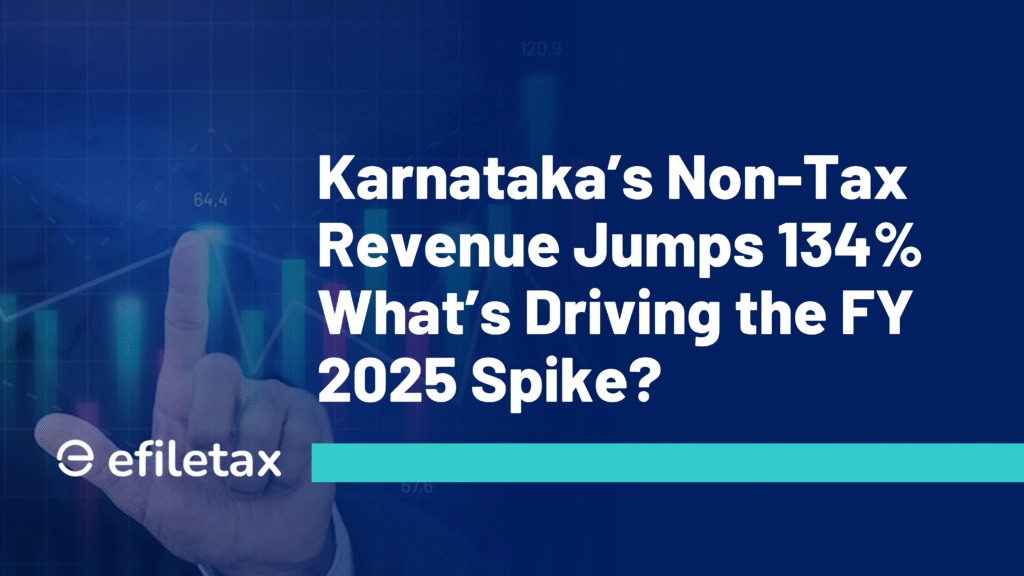
Karnataka Non-Tax Revenue Doubles in April–May FY 2025
Karnataka non-tax revenue rose by a staggering 134% in the first two months of FY 2025, compared to the same period last year. This sharp rise in collections is reshaping the state’s fiscal outlook and highlights the changing dynamics of government income beyond just GST and direct taxes.
But what exactly is non-tax revenue? Why does it matter for professionals, consultants, or even small business owners in Karnataka and across India? Let’s break it down.
What is Non-Tax Revenue?
Non-tax revenue is the income the government earns from sources other than taxes. This includes:
- Fees and fines (transport, mining, registration, etc.)
- Interest receipts on loans given by the government
- Dividends from state-owned enterprises (SOEs)
- Rent and royalties (especially from natural resources like mines, forests, etc.)
- User charges for services (like water, electricity boards)
These sources are crucial for state governments to reduce their dependence on tax revenue and fiscal transfers from the Centre.
Karnataka’s 134% Growth: What’s Behind It?
According to the Karnataka Finance Department, the state earned ₹2,695 crore in non-tax revenue during April–May 2024, compared to ₹1,152 crore in the same period last year.
Key Contributors to the Surge:
| Department | Contribution Boost | Key Source |
|---|---|---|
| Transport | High | Fines, permits, licensing fees |
| Mines & Geology | High | Royalties from mining leases |
| Registration & Stamps | Moderate | Fees on property transactions |
| Forest Department | Moderate | Timber, land lease income |
This boost reflects stronger enforcement, better digital tracking, and revised fee structures across departments.
Why This Matters to Taxpayers and Businesses
Karnataka’s improved non-tax revenue performance has three major implications:
- Lower Fiscal Deficit Pressure: Less borrowing = better credit ratings for the state
- Increased Development Spending: More funds available for infrastructure, subsidies, and welfare
- Higher Compliance Enforcement: Expect stricter fines, documentation, and digital audits across departments
Legal Backing and Policy Framework
The power to collect non-tax revenue comes from state-specific laws and rules. For instance:
- Karnataka Forest Rules, 1969 – for forest produce and lease income
- Mines and Minerals (Development and Regulation) Act, 1957 – for mining royalty
- Motor Vehicles Act, 1988 – for transport penalties
Most of these are supported by notifications issued by respective state departments, available at https://finance.karnataka.gov.in
Expert View: Watch Out for Rising User Charges
According to tax experts, states like Karnataka may increasingly rely on non-tax revenue to fund their budgets.
“With limited scope to raise new taxes, states will push user charges and stricter fee recovery. Be prepared for higher costs of compliance if you deal with transport, mining, or land,” says a Bengaluru-based indirect tax consultant.
Related:
👉 Read how GST collections performed in April–May 2025
Conclusion
The 134% rise in Karnataka’s non-tax revenue is a strong signal that Indian states are diversifying their income sources. For taxpayers and businesses, this means closer scrutiny, evolving compliance rules, and rising service fees.
Stay updated with the latest fiscal developments and compliance changes — let Efiletax help you navigate them with ease.
→ Need help with GST, licenses, or state department filings? Talk to Efiletax now
Summary
Karnataka non-tax revenue jumped 134% in April–May FY 2025, driven by higher collections from transport, mining, and forest departments. Learn why it matters.
FAQs
Q1. What is included in non-tax revenue?
Non-tax revenue includes government earnings from fees, fines, royalties, interest, dividends, and service charges.
Q2. Is non-tax revenue taxable for recipients?
Yes, if you’re earning from state contracts or leases, that income may be taxable under Income-tax Act depending on your business.
Q3. Can I claim deductions on fines or penalties paid to the government?
No. As per Section 37(1) Explanation, expenses in the nature of penalty or fine for infraction of law are not allowed as deduction.
Q4. Does higher non-tax revenue reduce my tax liability?
Not directly. But better state revenue health may reduce future tax hikes or compliance burdens.